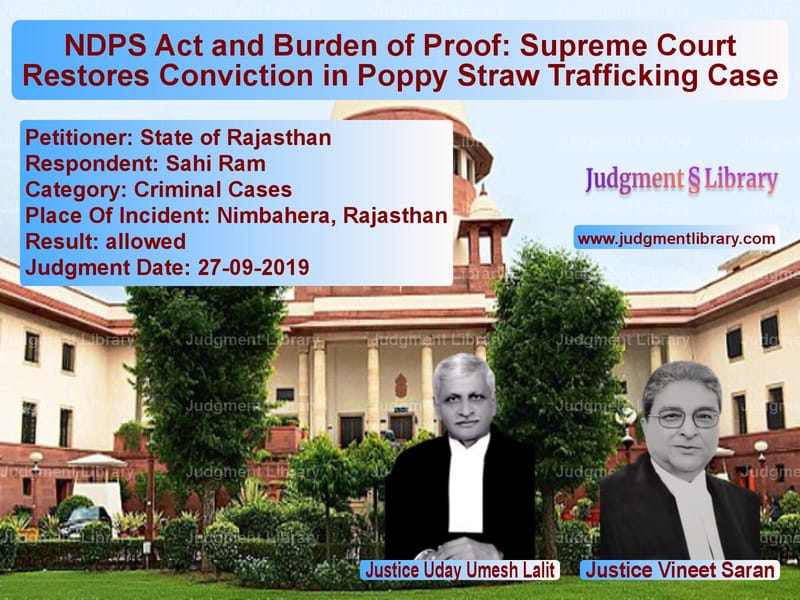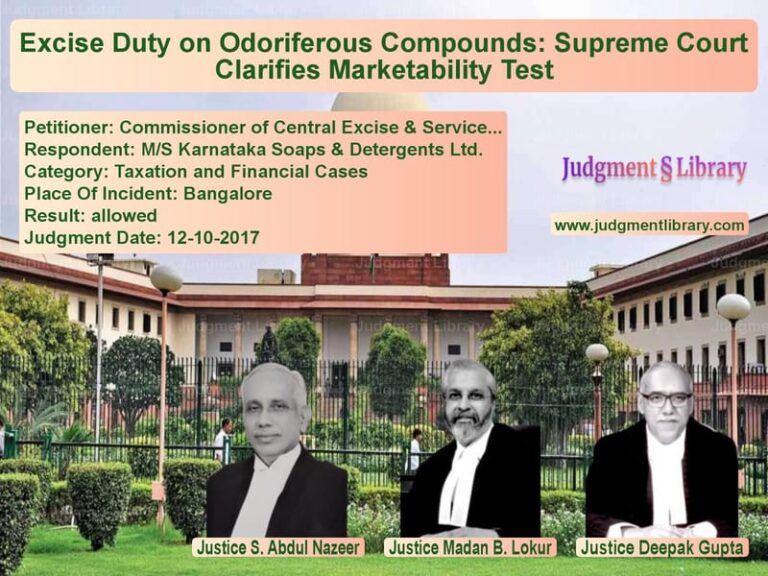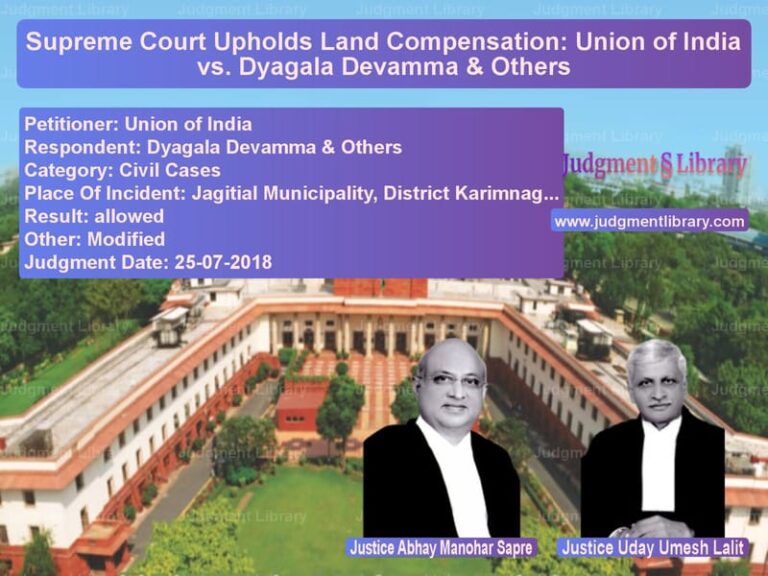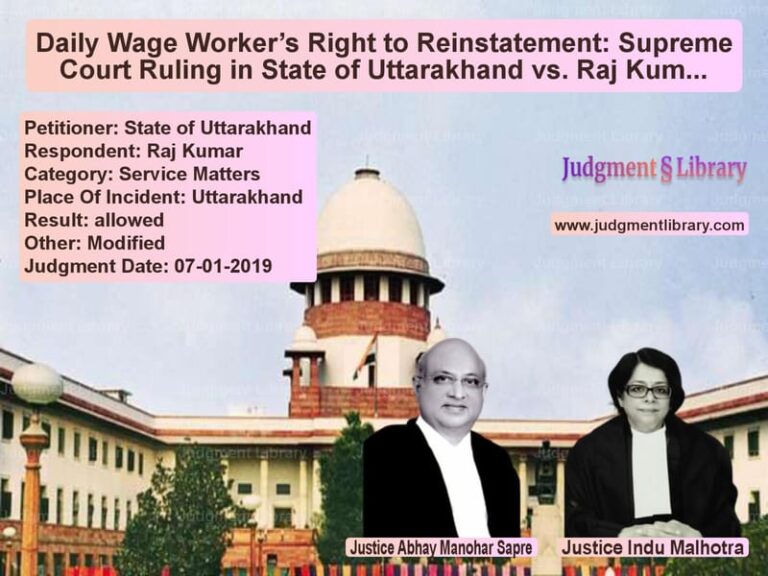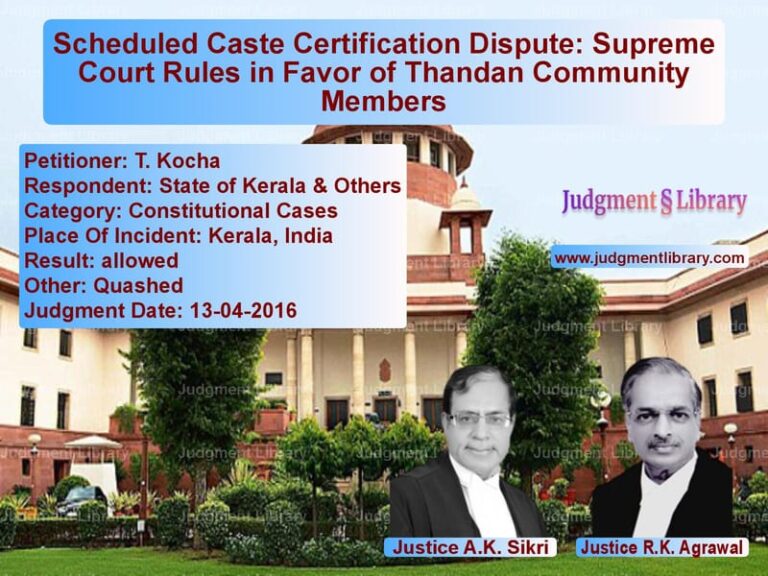NDPS Act and Burden of Proof: Supreme Court Restores Conviction in Poppy Straw Trafficking Case
The Supreme Court of India recently delivered an important judgment in the case of State of Rajasthan vs. Sahi Ram, focusing on the legal requirements for proving narcotics possession under the Narcotic Drugs and Psychotropic Substances (NDPS) Act, 1985. This case highlights how courts should handle the issue of physical evidence and the burden of proof in drug-related offenses.
Background of the Case
The case originated from a drug trafficking incident on June 20, 2006, when the police received intelligence that a white Tavera vehicle was transporting poppy straw from Madhya Pradesh to Jodhpur, Rajasthan. Acting on this tip, a police team intercepted the vehicle near a railway crossing in Nimbahera.
Upon searching the vehicle, the police recovered seven bags of poppy straw, totaling 223 kilograms. The vehicle was driven by Sahi Ram, and two other individuals, Sohan and Kanhaiya Lal, were also present. Following the seizure, the authorities registered a case under Section 8 read with Section 15 of the NDPS Act.
Key Legal Questions in the Case
- Whether the prosecution’s failure to produce the entire quantity of contraband in court was fatal to its case.
- Whether the conviction could be sustained based on seizure records, forensic reports, and witness testimony.
- Whether the accused had conscious possession of the seized contraband.
Arguments by the State of Rajasthan (Appellant)
The prosecution, representing the State of Rajasthan, argued:
- The contraband was lawfully seized and properly documented.
- Samples were collected in the presence of independent witnesses and sealed as per legal requirements.
- The accused signed the seizure memo, confirming the recovery.
- The trial court was correct in convicting the accused, as all procedural safeguards under the NDPS Act had been followed.
- Failure to produce the entire contraband in court was not sufficient to discredit the case, as long as samples and forensic evidence were available.
Arguments by Sahi Ram (Respondent)
The defense contended:
- The prosecution’s failure to produce the entire 223 kg of poppy straw in court raised doubts about the authenticity of the evidence.
- The High Court had correctly ruled that the non-production of the entire contraband was fatal to the case.
- The accused was merely a driver and had no knowledge of the presence of contraband in the vehicle.
- The independent witnesses had turned hostile, weakening the prosecution’s case.
High Court’s Decision
The Rajasthan High Court accepted the defense’s argument and acquitted Sahi Ram. It ruled that since the prosecution had failed to produce the entire seized contraband in court, the case could not be proven beyond reasonable doubt.
Supreme Court’s Observations
Upon hearing the appeal, the Supreme Court carefully examined previous judgments related to the NDPS Act and made the following key observations:
- The NDPS Act imposes strict liability, meaning that once possession is established, the burden shifts to the accused to prove their innocence.
- Production of the entire contraband in court is not mandatory if other evidence, such as seizure memos and forensic reports, establishes the offense.
- “If the seizure of the material is otherwise proved on record and is not even doubted or disputed, the entire contraband material need not be placed before the court.”
- The police had followed proper procedures, and the forensic report confirmed that the seized samples were indeed narcotic substances.
- The accused had signed the seizure memo, acknowledging the recovery, and there was no evidence of coercion or manipulation.
Final Judgment
The Supreme Court overturned the High Court’s acquittal and restored the trial court’s conviction. The Court sentenced Sahi Ram to 10 years of rigorous imprisonment, maintaining the fine imposed by the trial court. The Court directed the police to take Sahi Ram into custody immediately if he did not surrender within seven days.
Implications of the Judgment
- For Law Enforcement: The ruling clarifies that the prosecution does not need to produce the entire contraband in court, provided that other evidence establishes guilt.
- For the Judiciary: The decision reinforces that procedural safeguards under the NDPS Act must be upheld, but technical lapses should not automatically result in acquittal.
- For Accused Persons: The ruling highlights that signing a seizure memo can be a crucial piece of evidence against an accused in narcotics cases.
Conclusion
This Supreme Court judgment is a landmark ruling in NDPS law enforcement, setting a clear precedent that failure to produce the entire quantity of contraband in court does not automatically weaken the prosecution’s case. It strengthens the prosecution’s ability to secure convictions in drug trafficking cases and ensures that technical defenses do not undermine justice.
Petitioner Name: State of Rajasthan.Respondent Name: Sahi Ram.Judgment By: Justice Uday Umesh Lalit, Justice Vineet Saran.Place Of Incident: Nimbahera, Rajasthan.Judgment Date: 27-09-2019.
Don’t miss out on the full details! Download the complete judgment in PDF format below and gain valuable insights instantly!
Download Judgment: State of Rajasthan vs Sahi Ram Supreme Court of India Judgment Dated 27-09-2019.pdf
Direct Downlaod Judgment: Direct downlaod this Judgment
See all petitions in Drug Possession Cases
See all petitions in Bail and Anticipatory Bail
See all petitions in Fraud and Forgery
See all petitions in Judgment by Uday Umesh Lalit
See all petitions in Judgment by Vineet Saran
See all petitions in allowed
See all petitions in supreme court of India judgments September 2019
See all petitions in 2019 judgments
See all posts in Criminal Cases Category
See all allowed petitions in Criminal Cases Category
See all Dismissed petitions in Criminal Cases Category
See all partially allowed petitions in Criminal Cases Category

